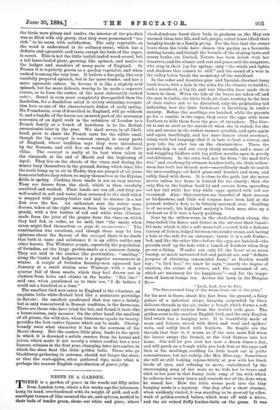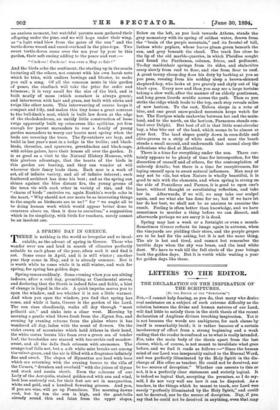NESTS IN A GARDEN.
THERE is a garden of peace in the woods not fifty miles from London town, where a few weeks ago the laburnum hung its head, overburdened with its weight of gold, and soft Amethyst tresses of lilac scented the air, and spirmas, nestled in their beds of tender green, shone out white and pure; where
rhododendrons burst their buds in gladness as the May sun warmed them into life, and tall, purple, velvet irises lifted their haughty heads in a family group. For the love that the owner bears them the birds have chosen this garden as a favourite nesting haunt, and though the bounds of the sloping lawn and mossy banks are limited, Nature has been lavish with her treasures, and the silence and rest and peace suit the songsters, who sing in their joy for spring; only " the winds and lights and shadows that cannot be still" and the sound of a weir in the valley below break the monotony of the woodland.
In the cedar and Austrian pine and Spanish chestnut hang larch boxes, with a hole in the sides for the titmice to build ir, and a marsh-tit, a big tit, and two blue-tits have made their homes in them. When the lids of the boxes are taken off and the nest is visible, the little birds sit close, trusting to the love of their visitor not to be disturbed, only the palpitating tail indicating how the little bird-heart is throbbing in tender anxiety. Before the nestlings are hatched, while the parents go for a ramble in the copse, they cover the eggs with loose feathers to hide them from the gaze of intruders. The blue- tit is not so civil as the marsh-tit when she is visited, for she sits and swears in the rudest manner possible, and spits again and again insultingly, and her mate dances about overhead, using such bad language that it is best to beat a retreat and peep into the other box on the chestnut-tree. There the parents hop in and out every thirty seconds, and a mass of red wriggling birdlets with big yellow mouths open in greedy watchfulness. In the erica bed, not far from "the mad little tits," and overhung by crimson heather-bells, the little willow- wren has built her domed nest—marvellously made to match the surroundings—of dried grass and heather and moss, and softly lined with down. It is close to the path, but she never moves unless her home is hunted for too closely ; then she only flies to the bushes hard by and cowers down, spreading out her tail while her tiny white eggs spotted with red are examined. Alas ! Skye-terriers are boastful of their success as birdnesters, and little red corpses have been laid at the present writer's feet, to be bitterly mourned over. Scolding is of no avail; his highland majesty's black nose stirs up a birdnest as if it were a hasty pudding.
Near by the willow-wren, in the rhododendron clump, the long-tailed tits dance and flatter in the air' over their beauti- ful nest, which is like a soft moss-ball covered with a delicate tracery of lichen, lodged between two tender stems, and having a hole at the side for an entrance ; inside it is a soft feather- bed, and like the other tits—before the eggs are hatched—the parents stuff up the hole with a bunch of feathers when they go out a-flying. Wonder can only fill the heart at so much beauty, so much unwearied toil and patient art, and " definite purpose of obtaining ornamental form," as Ruskin would say ; " a bird has," we know he says, " exactly the degree of emotion, the extent of science, and the command of art, which are necessary for its happiness,"—and for the happi- ness of human beings too. Across the lawn in the Douglas fir,—
" Look, look, how he flits,
The fire-crowned king of the wrens from out of the pine," for his nest is there, about five feet from the ground, a fairy palace of a spherical shape, hanging suspended by three delicate threads in the air, under a bough which forms a soft green canopy and curtain from the world's rude gaze. The golden-crest is the smallest English bird, and the only English bird which has a hanging nest. It is beautifully made of moss and lichens, mixed with down and wool and spiders' webs, and softly lined with feathers. So fragile are the threads that bear it, it seems as if the nest must fall when the breeze sways the branch, or the bird flatters into her home. She will let you visit her nest a dozen times a day, and will perch on a bough while you look first at the eggs and then at the nestlings, scolding its little heart out in polite remonstrance, but not rudely, like Mrs. Blue-cap. Sometimes she will sit still looking reproachfully at you with her black beads of eyes, and refusing to move, emboldened by the encouraging song of her mate as he bids her be brave and stick to her post in that funny little song of his, with which he relieves her weary hours and reminds her of the days when he wooed her. How the little wrens pack into the tiny hanging nests is a mystery. One day, after a short absence, when suddenly visited, it was startling to be greeted by a fire- work of golden-crested babies, which went off with a whizz, and the air rained fluffy feather-balls on the grass. It was
an anxious moment, but watchful parents soon gathered their offspring under the pine, and we will hope under their wing, as "a light wind blew from the gates of the sun" and the turtle-doves wooed and cooed overhead in the pine-tops. Two sweet turtle-doves come over the sea year by year to this garden, their soft cooing adding to the peace and rest :-
" Cuck-oo ! Cuck-oo ! was ever a May SD fair P" And the birds echo the sentiment, the starling up in the acacia imitating all the others, not content with his own harsh note which he tries, with endless bowings and bluster, to make you call a song. Of all the common nests in this garden of peace, the chaffinch will take the prize for order and trimness ; it is very small for the size of the bird, and is built neatly of moss (which somehow is always green), and interwoven with hair and grass, not built with sticks and twigs like other nests. This interweaving of course keeps it compact and tidy, and makes this tiny home a great contrast to the bull-finch's nest, which is built low down at the edge of the rhododendrons, an untidy little construction of loose twigs apparently built up criss-cross like spilikins, yet firm enough for. parent marauders to rear a family of young garden marauders to worry our hearts next spring when the buds are covering the trees. The fly-catchers are lazy, and build in last year's nest in a hedge in the trellis; and black- birds, throstles, and sparrows, greenfinches and black-caps, with robins galore, have their homes all over the garden. It is as good as a visit to the Natural History Museum, with this glorious advantage, that the hearts of the birds in this garden are beating, and they can wander at will wherever their fancy leads them. Each nest is a work of art, all of infinite variety, and all of infinite interest ; each feathered architect has done his best ; and as the spring sun shines against the blue distant firs, the young greens of the trees vie with each other in variety of tint, and the " charm of birds " encircles us, again Ruskin's words echo in the heart, " Why should not our nests be as interesting things to the angels as birdnests are to us ?" for " we ought all to be doing human work which would appear better done to creatures above us, than it does to ourselves," a supposition which in its simplicity, with birds for teachers, surely cannot be an insolent one.



















































 Previous page
Previous page